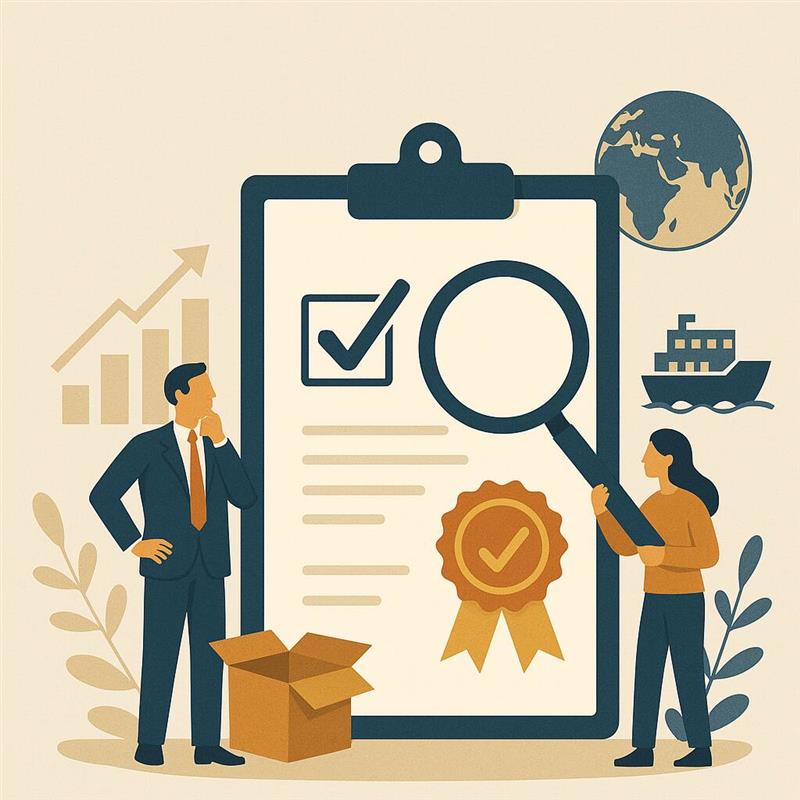
Demystifying Accreditation: Why It Matters for Businesses and Trade
Some years ago, my sister, an Indian Revenue Service officer, asked me, “Anil, what exactly do you do?”
I told her, “I work in accreditation".
Her puzzled response—“Does that even make sense?”—is something I have often encountered. To simplify, I asked if she had heard of ISO 9001. She said yes. I explained, “There are agencies that certify organizations against ISO 9001. My job is to accredit these agencies as per international standards so that their certificates are recognized globally.” Finally, it made sense to her.
The episode illustrates how obscure accreditation can appear—even to one’s family. To complicate matters, the term “accreditation” is also used in hospitals (NABH in India, JCI in the US) and education (NAAC in India, AMBA/BGA for business schools). But the accreditation I was involved in is different—it underpins the credibility of laboratories, inspection agencies, and certification bodies across industries.
What Is Accreditation?
We live in a world governed by standards. These may apply to products (an electric iron), services (training), processes (organic farming), management systems (ISO 9001), or even people (welders, yoga teachers).
To ensure compliance with standards, we need competent organizations—laboratories, inspection agencies, certification bodies—to test, inspect, audit, or certify. But how can businesses or consumers be assured of their competence?
"Accreditation, though often misunderstood, plays a crucial role in ensuring trust in global standards. Unlike hospital or educational accreditation, it evaluates the competence, impartiality, and consistency of laboratories, inspection agencies, and certification bodies. Guided by ISO 17000 series standards, accreditation bodies (ABs) operate worldwide—some state-backed, others private. In India, long dominated by NABL and NABCB, the field now includes private and foreign ABs, though the market remains unregulated. Globally, AB credibility is upheld by ILAC (testing/inspection) and IAF (certification), soon merging into the Global Accreditation Cooperation in 2026.
Front Foot Forward”
Their peer-review system ensures certificates issued in one country are recognized worldwide, supporting free trade and regulatory compliance. While fraudulent certifiers exist, authentic accreditation can be verified via AB logos or the IAF global database. Ultimately, accreditation fosters confidence, protects consumers, aids regulators, and enables international trade—making it indispensable for businesses in a globalized economy. This is where accreditation comes in. Accreditation is a formal system that evaluates and recognizes the competence, impartiality, and consistency of these “conformity assessment bodies.” - By Anil Jauhri
The Global System
Accreditation itself is guided by international standards, mainly the ISO 17000 series. For example, ISO 17020 applies to inspection bodies, ISO 17021 to management system certification bodies, and ISO 17065 to product and service certification.
Organizations that apply these standards are called accreditation bodies (ABs). In developed countries, they are often private; in developing economies, usually government-backed. Some regions, such as Europe, legally mandate a single national AB. In others—including the US, Japan, Korea, and India—multiple ABs coexist.
India long had two national ABs—NABL and NABCB. But in recent years, private ABs like QAI, FDAS, and IQAS have emerged, alongside foreign ABs offering services here. Importantly, there is no law in India restricting or regulating accreditation bodies; it is an open, unregulated market.
Globally, the credibility of ABs rests on two voluntary international networks:
• ILAC (International Laboratory Accreditation Cooperation) – covering testing and inspection.
• IAF (International Accreditation Forum) – covering certification and validation/verification.
These two are set to merge into the Global Accreditation Cooperation (GAC) in 2026. Through regional groups (such as APAC in Asia-Pacific or EA in Europe), they evaluate ABs every four years. This peer-review system ensures global equivalence: a certificate issued under an accredited system in one country is accepted worldwide. That international recognition is the true USP of accreditation.
Accreditation in Practice
Although participation is voluntary, market forces and government regulations drive conformity. Many regulators, including India’s FSSAI (food) and CDSCO (medical devices), already require accreditation under this global system. Free Trade Agreements (like the India–Singapore FTA in 2005) also reference it, enabling mutual acceptance of test reports and certifications.
That said, parallel systems exist. For instance:
• UNFCCC runs its own accreditation for carbon validation/verification bodies.
• APEDA manages accreditation for organic certification in India.
bull; Scheme owners like SA8000 or the Forest Stewardship Council operate dedicated accreditation systems.
These are important but relatively limited. For most businesses, the ILAC/IAF system remains the safest, most widely accepted route.
Spotting Authentic Accreditation
Accreditation rests on three pillars: impartiality, competence, and consistency. To verify if a test report or certificate is genuinely accredited, look for the accreditation body’s logo (the accreditation mark). Most ABs mandate its use.>
Another check is the IAF global database (https://www.iafcertsearch.org/), which lists authentic ISO certificates (like ISO 9001 or 14001). If a certificate isn’t listed, it’s likely invalid.
Unfortunately, many fraudulent accreditation bodies and certifiers operate, particularly in developing countries. They lure businesses with attractively designed “ISO certificates” at very low prices. These are often nothing more than certificate-printing mills. Businesses must remain cautious.
Why Accreditation Matters
At its core, accreditation ensures that conformity assessment bodies are competent and trustworthy. This assurance has far-reaching benefits:
• Businesses gain confidence in their suppliers and partners.
• Consumers trust the safety and quality of products and services.
• Governments rely on it in regulatory frameworks.
• Global trade is facilitated through mutual recognition of certificates and test reports.
In short, accreditation builds confidence, prevents fraud, and helps businesses avoid costly mistakes. For organizations navigating today’s globalized markets, relying on accredited certification, inspection, or testing bodies is not just advisable—it is essential. ( The Author is ex-CEO, National Accreditation Board for Certification Bodies and an international authority on standardisation)
The original content is pubished on https://mediamap.co.in/blog/DemystifyingAccreditationWhyItMattersforBusinessesandTrade
Submit your email ID to receive notifications about upcoming courses and events
